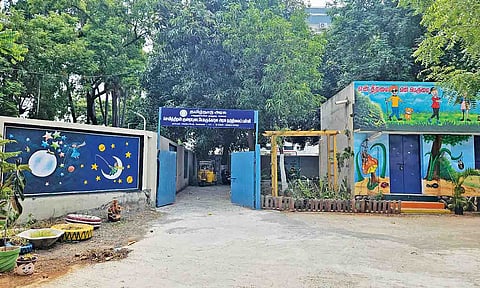

CHENNAI: Across Tamil Nadu, the state government runs 21 special schools for children with special needs. Of them, 10 each cater to students with visual and hearing impairments and one to children with severe disabilities.
The government has been aiming for a combined student strength of 2,250 across these institutions since 2021. However, in the academic year 2024–25, the enrollment stood at just 1,023, not even reaching the halfway mark for the year.
One of the critical challenges is teacher availability. Special schools are supposed to maintain a student-to-teacher ratio of 1:8 (recently revised to 1:10), but this standard is not consistently met. In a particular school, the very position of a headmaster remains vacant.
A headmaster of a hearing-impaired school said, "Each student needs separate care. It is draining and tough to cope with a smaller number of teachers." Their school has six teachers, two of whom were recently transferred, with replacements still awaited.
To cope, schools are resorting to clubbing classes: "Students of classes 2 and 3 are clubbed together; similarly, other classes are combined together."
A hearing-impaired school in the western region, which teaches up to class 10, operates similarly. "We have three grade II teachers and two graduate teachers who are qualified to teach classes 9 and 10. But right now, one teacher is handling classes 1 to 5, and the other four are handling classes 9 and 10."
Most headmasters believe that the primary reason behind the dwindling enrollment is the Right to Education Act's mandate for inclusive education. It gives the right to children with disabilities to be accommodated in mainstream schools.
"We are all in for inclusive education, but practically, in the state's current infrastructure, it is not possible. It actually puts the children on the back foot," said a teacher who has been teaching visually impaired students for 14 years.
Another recurring challenge is the lack of full-time special educators. Government data states there are 1,024 special educators across Tamil Nadu. These teachers are often shared across multiple government schools. "We have to juggle between multiple schools," a special educator said. "It is impossible to give full-time attention to 5–6 students in each school."
A headmaster pointed out that many parents, citing nearby distance and mainly due to hesitation about putting their children in special schools, opt for normal schools. "But we are the teachers who are trained to teach them."
Almost 85 per cent of students in special schools are hostellers. Only seven of these special schools offer higher secondary education. With only 10 schools each for hearing and visually impaired children across 38 districts in the state, many students are forced to travel long distances. This often deters parents from enrolling them in special schools.
Meanwhile, teachers argue that inclusion in mainstream schools will never yield the desired result.
"We are here in a 1:8 or 1:10 ratio and still feel burdened. In normal schools, there is one teacher for 40 kids. Whom will they concentrate on? Can they afford additional care for 3–4 special children in their class?"
Special school heads also allege manipulation by regular schools. "To keep their strength up and claim inclusivity, regular schools admit these children up to Class 8. But to maintain their 100 per cent pass record in board exams, they push them to special schools after that."
However, the special schools do yield considerable results in board exams. Of the seven schools, two schools recorded 100 per cent results in class 12 exams, and three schools recorded above 90 per cent. Similarly, for class 10 board exams, 6 of the 8 schools recorded 100 per cent results in the academic year 2024-25.
Heads of the special schools wish they would get similar visibility compared to the state-run schools, which function under the School Education department. "There are district and block-level administrative setups there. For us, everything has to be done from Chennai," said a school in-charge.
The Commissioner for Welfare of the Differently Abled, M Lakshmi, IAS, attributed the issue to parents' perception and not to the school system.
"If we want our differently abled children to truly do well, they should be enrolled in special schools from the beginning," she said
Despite the crucial role these schools play, they remain administratively isolated. Unless the state reconsiders its approach to inclusive education and brings systemic reforms, the purpose of special schools may continue to erode.